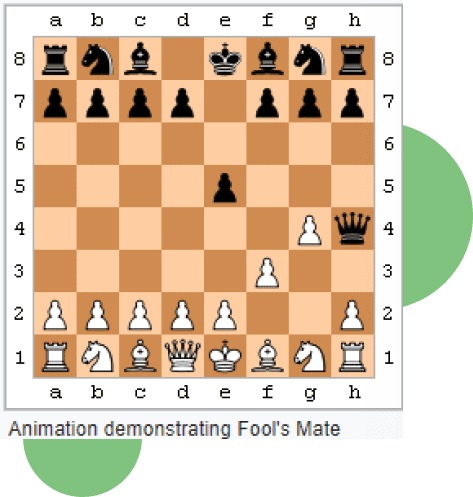U.S. E-Commerce Expansion
What sequence of moves should you make first?
Determining which moves to make first when you expand your e-commerce business to the U.S. is similar to playing chess. There are opening mistakes and traps to avoid. Only novice chess players will make iconic mistakes that lead to “fool’s mate,” a classic two move checkmate.
The challenge with expanding to the U.S. is there are several opening mistakes to avoid making, but what’s worse than “fool’s mate,” where you find out very quickly that you have lost the game? These blunders create U.S. “fool’s tax” that may not show up until 2-3 years later, with an IRS or state tax notice.

Lag Time to Determine Your Wrong Opening Moves
Some opening moves will cause your Amazon.com account not to be approved; for example, using a different address on your new Amazon.com account than on your bank account. Successful sellers avoid these basic mistakes.

THREE LEVELS OF PLAYERS

This type of expander is only considering one or two moves ahead to get their Amazon.com seller central account set up, as an example. They are not very strategic. They typically have either researched a simple checklist to open an Amazon.com account to start as a seller or provided to them by a coach or marketing group. The coach or group’s goal is to give you the simple steps for creating momentum so you don’t quit, which makes sense.
Some of these sellers do experience success, with a lot of luck, which involved either the right product selection or timing in the market. For example, those who were selling workout at home products on Amazon in February of 2020 saw an explosion in sales in March and April due to COVID triggering gyms’ closing.
Novice Player Profile/Characteristics:
- They are a newbie seller
- Limited funds to get started
- Looking for lowest-cost solutions due to lack of funds
- Are only able to make the next move hoping things work out
- The largest percentage of business failure rate
Factors and Considerations at Each Level of a U.S. Ecommerce Expander
Here is the “game played” or expansion pathway by all three E-Commerce Expanders. The goal is to expand and sell on Amazon.com.
They do research and find out the bare minimum to set up an Amazon Seller Central Account, and they find out that all that is required:
- Sign up as an Amazon.com professional seller (not individual sellers)
- Provide the following
- Business name, address, and contact information
- An international chargeable credit card
- Phone number
- Complete the tax interview
- Looking for lowest-cost solutions due to lack of funds
- Are only able to make the next move hoping things work out
- The largest percentage of business failure rate

This type of expander already has an existing business in another country, selling online, and has had some success increasing sales over their first year in business. They have discovered there are many more steps involved with e-commerce than they first thought, and their competence is growing every day. Finally, they have cash flow but little – if any – profits, so they still only ask 2-3 questions and are very focused on the low-cost solutions to save money short-term versus trying to maximize their time and profits the next 12 months.
Class A-D Player Profile/Characteristics:
- They have been in the selling business for one-year
- They have cash flow but little or no profits
- Looking for low-cost solutions due to lack of profits
- They only want to know the next steps to sell in the U.S.
- They have a much greater chance of beating the odds because they made it past the first year in business
Class A-D:
They do more research since they are working with an e-commerce accounting or tax firm. For example, an EU seller knows that VAT compliance is required, so they work with a firm for compliance. This seller has access to more information about expanding to the U.S.
- Before signing up for an Amazon.com professional account, they do research.
- They realize it is simple to register on Amazon.com with all their foreign details, but they check to see any issues with updates later.
- They read up on sales tax and other U.S. compliance steps and determine Amazon is collecting in 43 states, so this is not a concern.
- They realize it may be beneficial to have an EIN, and they read online. They can call the IRS to get their own over the phone, saving themselves money.
- They look to establish a U.S. mailing address for convenience and find a low-cost provider with good reviews.
- They will wait until the end of the year to look at taxes, to determine what returns may need to be filed
- They have read about the possible benefits of forming a U.S. LLC, and some will take that step and form a simple one out of Wyoming.

This type of expander is a seven-figure-plus seller and runs a profitable business with a successful team. They have to build a valuable brand and are very detailed in their analysis of expanding to the U.S. They realize it is much more involved to find the lowest cost service provider online for the next step, “move.” They will seek out a one-stop-shop provider with detailed information to maximize their time, value, compliance, and profits, without taking any unnecessary risk or devastating shortcuts for their business or brand.
Grand Master Profile/Characteristics:
- High seven-figure-plus seller
- Selling on more than one platform internationally
- Profitable business
- Team assembled
- They have built and sold e-commerce businesses
- Looking for advisors and a one-stop-shop for guidance to protect and grow their brand
- Evaluate multiple factors involved in the process, including steps for future U.S. growth
- They are part of the 5% that is in business and expanding five years from now
Grand Master:
They start with the end in mind. They are focused on their goal. Is that a 7-8 figure exit? Add another seven figures in sales to their brand? It could also be an expert in another field, entering e-commerce for the first time, as they carefully calculate all the requirements to launch. They plan out the first year tax responsibilities and all the fees. They plan on selling on other platforms, including Walmart. They have spoken to their tax professionals in their home country and gotten their advice. They seek out professionals in the U.S. They realize they have to understand their opponent first (in this case, that refers to the marketplaces, U.S. federal and state sales tax, trademarks, advertising costs, product development lead time, cash flow requirements, and others). They are looking to grow and protect their already valuable brand.
- Before setting up a U.S. e-commerce account, they search out experts that understand all U.S. expansion components, including state sales tax and federal income tax, tax treaties, trademarks, the value of the U.S. entity vs. foreign entity.
- They invest in a strategy session or two with several resources to formulate a game plan to move forward.
- They have an exit strategy in mind
- They execute their plan with a proper budget, and they understand the foundation of the U.S. expansion is critical.
- They can't afford to damage their brand or reputation by not complying with U.S. taxes.
- The patterns of success are apparent. Even if you don't have the current success as a Grand Master, you can follow in their footsteps and first take a step back and invest in a proper evaluation of your best strategy to ensure you can succeed in the U.S. e-commerce markets.

